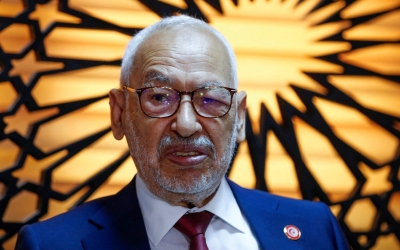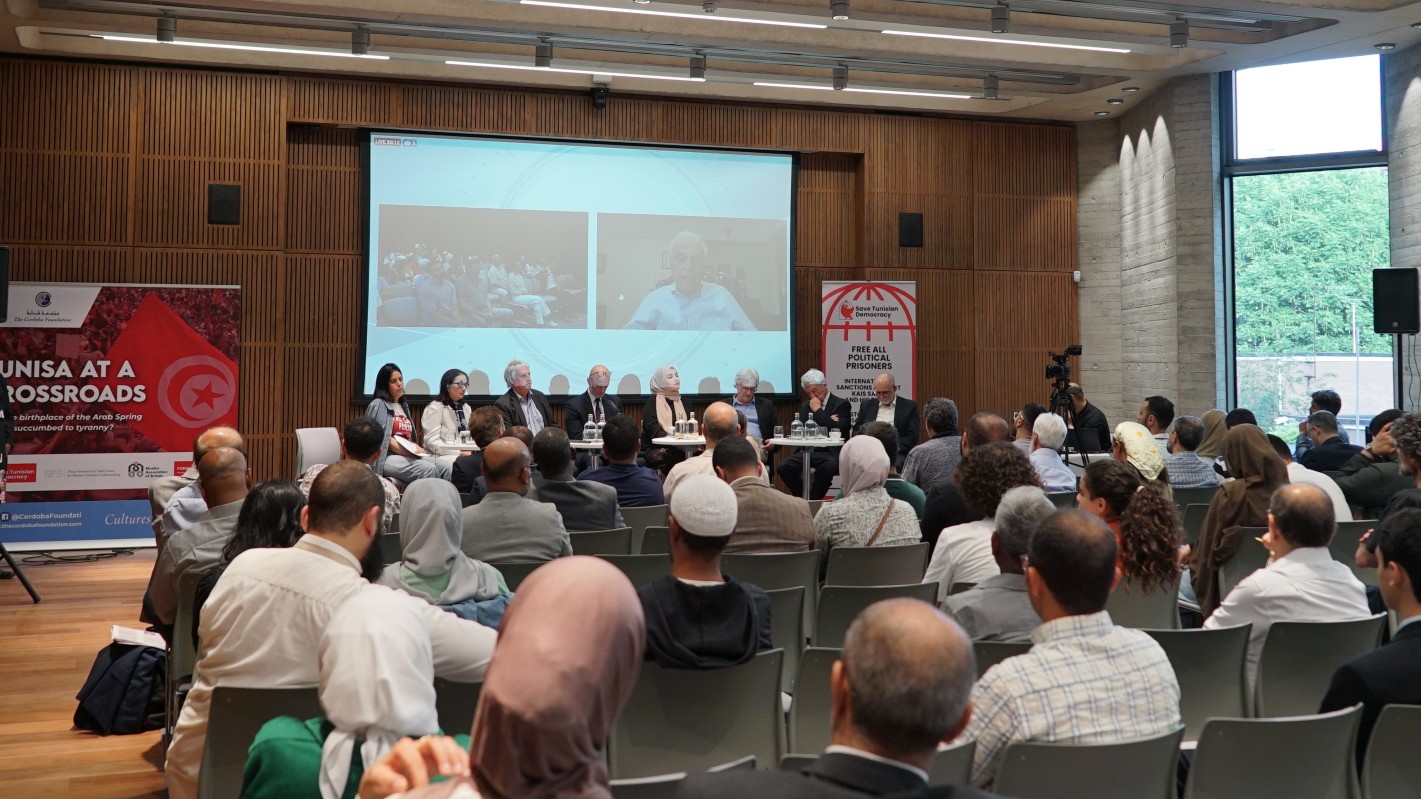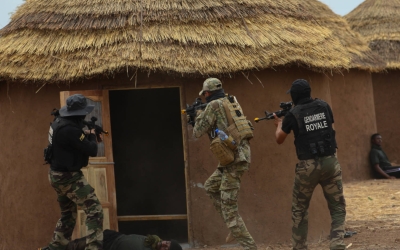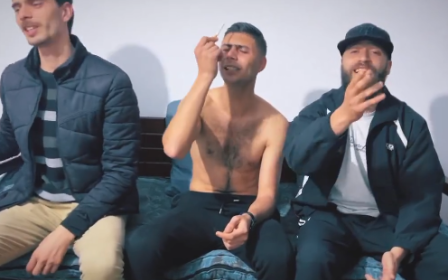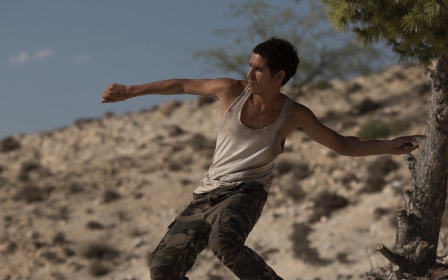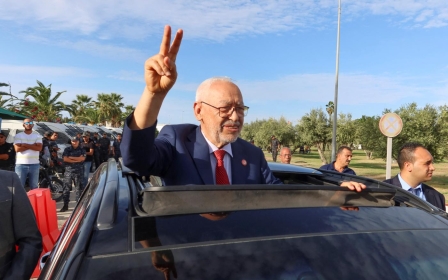Tunisia: Families of jailed politicians renew call to sanction Saied's inner circle
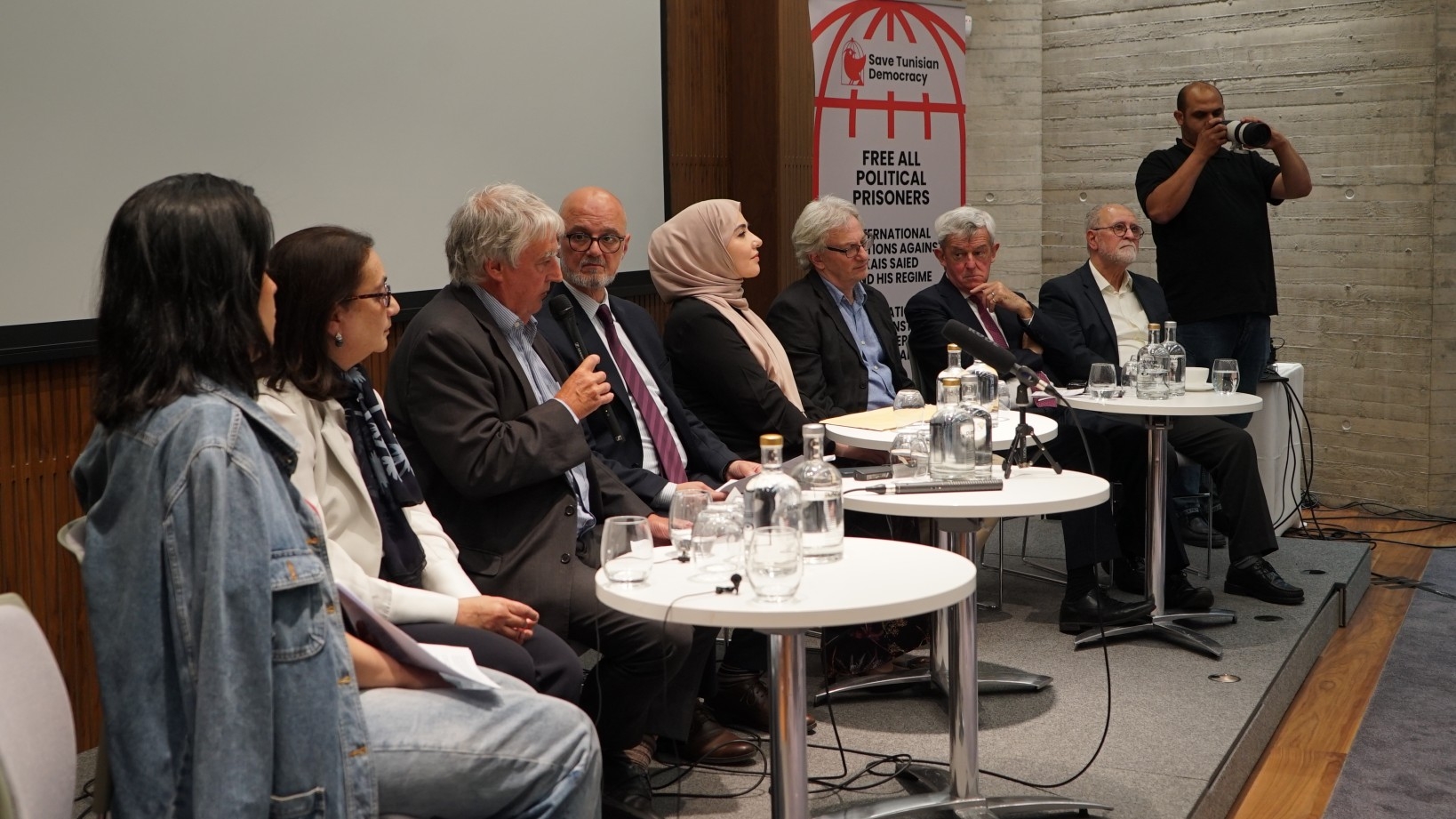
The families of jailed Tunisian opposition figures have renewed calls for the United Kingdom, European Union and United States to sanction President Kais Saied, citing the ongoing arrest and torture of "anyone deemed critical of his government".
Speaking at a press conference in London on Friday, British lawyer Rodney Dixon said the families were also seeking to sanction Interior Minister Kamal Feki and Defence Minister Imed Memmich amid the widening crackdown on dissent.
"We have asked the government here in the United Kingdom to impose sanctions on these individuals. We've also done the same in the EU as well at the European Parliament, and an initiative has also been undertaken in the United States," Dixon said.
"If the sanctions are to be imposed, these persons will not be able to travel and continue business as usual around the world. Their bank accounts and those of their associates and companies will be tracked down and frozen and they won't be able to do transactions in our countries as though everything is normal," he added.
In recent months, Saied has embarked on what Amnesty International describes as a "politically motivated witch hunt," with authorities arresting dozens of political activists, judges and lawyers.
New MEE newsletter: Jerusalem Dispatch
Sign up to get the latest insights and analysis on Israel-Palestine, alongside Turkey Unpacked and other MEE newsletters
Several prominent opposition figures have been detained including former UK resident Said Ferjani, former justice minister Noureddine Bhiri and former public prosecutor Bechir Akremi.
'British policy makers, from the [foreign] minister down to the ambassador, have drunk the Kool-Aid. They do nothing but repeat the talking points of Kais Saied'
- David Hearst, editor-in-chief of Middle East Eye
Ferjani, 68, was detained without an arrest warrant on 27 February and has not been charged with any offences. He launched a hunger strike earlier this year in protest against his continued detention.
Bhiri was violently taken from his home on 13 February and later appeared in court with a dislocated shoulder. Meanwhile, Akremi was arrested on 12 February and taken to an undisclosed site where he was held in a stress position for 25 hours.
The renewed call for sanctions also comes on the heels of the arrest of former speaker of parliament, and leader of the Ennahda party, Rached Ghannouchi.
Speaking at the conference, Ghannouchi's daughter Soumaya hit out at Saied over the recent wave of arrests and lamented the dismantling of institutions that a decade earlier had made Tunisia a beacon for democracy in the Arab world.
"In the dead of night, he [Saied] barricaded parliament with military vehicles, tore apart the constitution he was sworn to protect and wrote his very own and bulldozed over all the check and balance institutions," she said.
"On the ruins of our democracy, and the sweat and blood of generations of men and women who fought hard and long to create it, he erected his one man system. A modern day Emperor governing by decree, guided by nothing but his own instincts and caprice."
'You hand-picked your nemesis'
Tunisia has been engulfed in a deepening political crisis since July 2021 when Saied unilaterally suspended parliament and dissolved the government.
After the power grab, the plans for which were first revealed by Middle East Eye, Saied decided to rule by decree, a move his opponents decried as a "constitutional coup".
The North African nation would hold parliamentary elections in December, but rights groups and political opponents have repeatedly labelled the process a sham.
Just over 10 percent of eligible voters decided to cast their ballots in an election where political parties were banned.
In recent months, opposition to Saied has grown largely due to unpopular economic reforms, including spending cuts and the restructuring of public companies.
Tunisians have also been hit hard by the fallout from Russia's invasion of Ukraine, with soaring food prices and shortages of basic staples such as sugar, vegetable oil and rice.
David Hearst, the co-founder and editor-in-chief of Middle East Eye, lashed out at Saied over the worsening political situation, but also accused Ennahda of failing to anticipate the president's undemocratic ambitions.
Hearst said that for several months after the powergrab, Ennahda failed to publicly denounce Saied despite knowing that president, who is backed by the military, was planning a broader crackdown.
"You hand-picked your nemesis. What made you back Kais Saied?," Hearst asked. "He [Saied] previously said what he was going to do. I found an interview in 2011 where he said that political parties were rotten, parliament was wrong and the only path for Tunisia was direct democracy.
"All the things you [Ennahda] said that made you [Tunisia] different: your constitution, your parliament, your courts, your elections; they've all gone up in smoke. You're either in prison or back in Ealing [a district of London where some Ennahda supporters previously sought refuge]," he said.
"You [Ennahda] occupied the moral high ground but you couldn't defend it against people who use really dirty tactics," he added.
During the 2019 runoff presidential election, Ennahda threw its support behind Saied when he went up against media magnate and populist Nabil Karoui. Saied would win the vote in a landslide after many voters saw the retired professor as an outsider untainted by corruption.
Democratic backsliding
Hearst added that while Dixon and others were taking the necessary steps in the courts, it was unlikely such legal measures would force Britain to change its Tunisia policy.
"British policy makers, from the [foreign] minister down to the ambassador, have drunk the Kool-Aid," he said. "They do nothing but repeat the talking points of Kais Saied, just like what we see in Egypt, Libya or Israel."
Oliver McTernan, the director and co-Founder of Forward Thinking, agreed adding that "all the evidence suggested that Europe, and in particular the UK, were carrying on as business as usual."
"I was shocked to discover that some of the UK army are training to Tunisians in counterterrorism, probably techniques that are now used to suppress true Democrats, not potential terrorists," he said.
The United States has also faced criticism over its approach to Tunisia, despite the State Department's 2024 budget request calling for economic support to be slashed by nearly 70 percent.
MEE reported in April that Washington's military partnership with Tunis was expanding, and a division from the Wyoming National Guard was travelling to the country to help build firing ranges and a counter-IED (Improvised Explosive Device) training facility.
Earlier this week, two US senators introduced legislation to limit funds to cash-strapped Tunisia until it restored so-called "checks and balances".
"Tunisia emerged from the Jasmine Revolution and Arab Spring as a rare example of a nascent and developing democracy," said Senator Jim Risch, a Republican from Idaho.
"Unfortunately, Tunisian President Kais Saied has taken several drastic actions that have undermined Tunisia’s democratic institutions and consolidated power in the executive."
Middle East Eye delivers independent and unrivalled coverage and analysis of the Middle East, North Africa and beyond. To learn more about republishing this content and the associated fees, please fill out this form. More about MEE can be found here.


